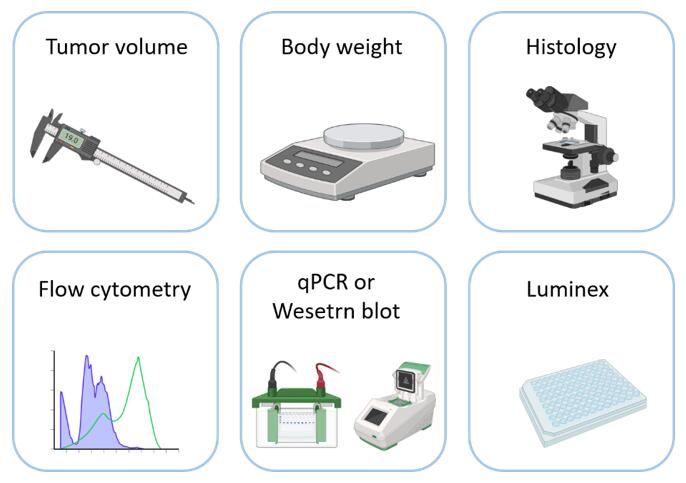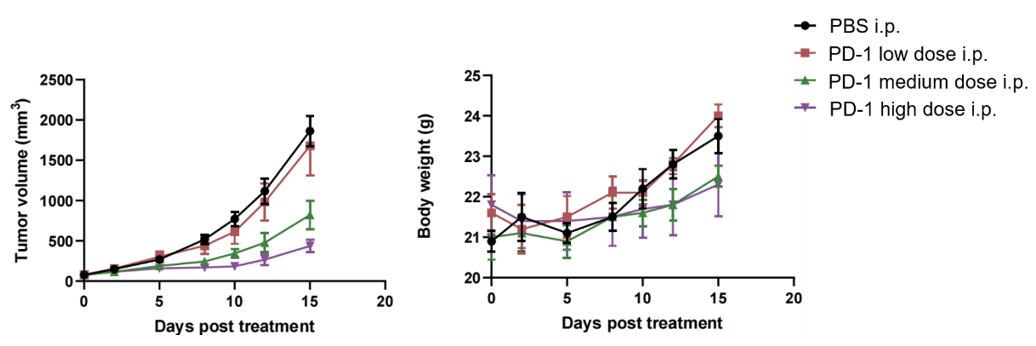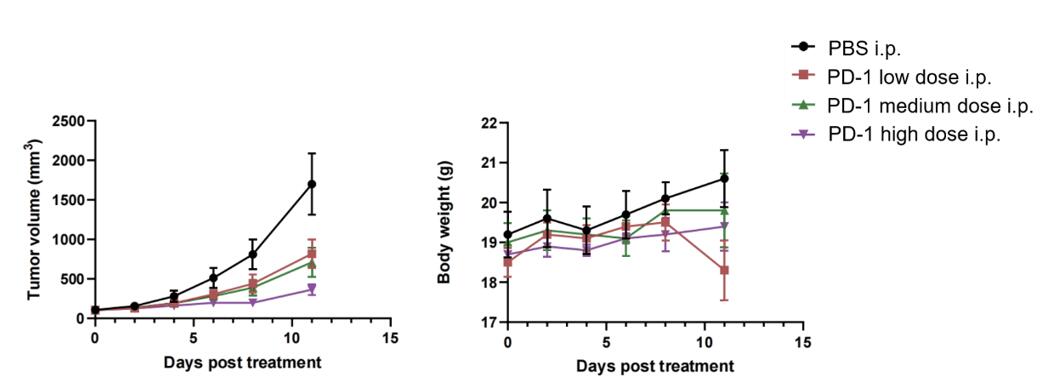- You are here: Home
- Disease Models
- Oncology Models
- Syngeneic Mouse Models
Disease Models
- Oncology Models
-
Inflammation & Autoimmune Disease Models
- Rheumatoid Arthritis Models
- Glomerulonephritis Models
- Multiple Sclerosis (MS) Models
- Ocular Inflammation Models
- Sjögren's Syndrome Model
- LPS-induced Acute Lung Injury Model
- Peritonitis Models
- Passive Cutaneous Anaphylaxis Model
- Delayed-Type Hypersensitivity (DTH) Models
- Inflammatory Bowel Disease Models
- Systemic Lupus Erythematosus Animal Models
- Asthma Model
- Sepsis Model
- Psoriasis Model
- Atopic Dermatitis (AD) Model
- Scleroderma Model
- Gouty Arthritis Model
- Carrageenan-Induced Air Pouch Synovitis Model
- Carrageenan-Induced Paw Edema Model
- Experimental Autoimmune Myasthenia Gravis (EAMG) Model
-
Cardiovascular Disease Models
- Surgical Models
- Animal Models of Hypertension
- Venous Thrombosis Model
- Atherosclerosis model
- Cardiac Arrhythmia Model
- Hyperlipoidemia Model
- Doxorubicin-induced Heart Failure Model
- Isoproterenol-induced Heart Failure Model
- Arterial Thrombosis Model
- Pulmonary Arterial Hypertension (PAH) Models
- Heart Failure with Preserved Ejection Fraction (HFpEF) Model
-
Neurological Disease Models
- Alzheimer's Disease Modeling and Assays
- Seizure Models
- Parkinson's Disease Models
- Ischemic Stroke Models
- Acute Spinal Cord Injury (ASCI) Model
- Traumatic Brain Injury (TBI) Model
- Hypoxic-Ischemic Encephalopathy (HIE) Model
- Tourette Syndrome (TS) Model
- Amyotrophic Lateral Sclerosis (ALS) Model
- Huntington's Disease (HD) Model
- Intracerebral hemorrhage (ICH) Models
- Pain Models
- Metabolic Disease Models
- Liver Disease Models
- Rare Disease Models
- Respiratory Disease Models
- Digestive Disease Models
-
Urology Disease Models
- Cisplatin-induced Nephrotoxicity Model
- Unilateral Ureteral Obstruction Model
- 5/6 Nephrectomy Model
- Renal Ischemia-Reperfusion Injury (RIRI) Model
- Diabetic Nephropathy (DN) Models
- Passive Heymann Nephritis (PHN) Model
- Adenine-Induced Chronic Kidney Disease (CKD) Model
- Kidney Stone Model
- Doxorubicin-Induced Nephropathy Model
- Orthopedic Disease Models
- Ocular Disease Models
- Skin Disease Models
- Infectious Disease Models
Syngeneic Mouse Models
Creative Bioarray is dedicated to providing premier syngeneic mouse model services, crafted to be an indispensable tool for the initial assessment of innovative immunotherapies-including vaccines, mRNA therapies, immune checkpoint inhibitors, antibody-drug conjugates, and cellular therapies like CAR-T and NK cell treatments, as well as traditional anti-cancer modalities such as chemotherapy and radiotherapy. Our unwavering commitment to excellence guarantees that these models are not only of superior quality but also customized to address the varied requirements of our clients, thereby accelerating progress in cancer research and therapeutic innovation.
Syngeneic mouse models represent the optimal choice for preclinical evaluation of pioneering immune-oncology (IO) therapeutics, providing a distinctive milieu for assessing treatments within the context of a fully operational, intact immune system. These models are meticulously derived from immortalized murine cancer cell lines, sourced from inbred mouse strains and subsequently implanted into genetically congruent recipients. This methodology not only obviates the necessity for immunocompromised mice but also furnishes an indispensable platform for elucidating the intricate interplay between cancer and the immune system. Consequently, the scientific team at Creative Bioarray advocates for the utilization of syngeneic mouse models as an initial step in gauging the efficacy of novel immunotherapy interventions. However, for more sophisticated investigations, the experts at Creative Bioarray suggest transitioning to humanized mouse models to further refine therapeutic strategies.
 Fig. 1 Syngeneic mouse models.
Fig. 1 Syngeneic mouse models.
Key Advantages
- Investigate Cancer Immunotherapies
Acquire pertinent data and gain deeper insights into the mechanisms of action and efficacy of emerging treatments aimed at immune cell interactions.
- Utilize Models with Intact Immune Competence
Facilitate research on the dynamic interplay among tumor cells, immune cells, the microenvironment, and the microbiome.
- Enjoy Simple, Economical Options
Produce dependable outcomes using animals that are inherently more cost-effective than xenograft models.
Syngeneic Mouse Models in Creative Bioarray
- Animal Species
C57BL/6 mouse
- Endpoints
Creative Bioarray's syngeneic mouse model platform boasts strong analysis capabilities, providing comprehensive endpoint screening services. The following indications are recommended for research that utilizes syngeneic mouse models:

Example Data
 Fig. 2 Effect of PD-1 therapy on tumor volume and body weight in mice with colon cancer (CT-26).
Fig. 2 Effect of PD-1 therapy on tumor volume and body weight in mice with colon cancer (CT-26).
 Fig. 3 Effect of PD-1 therapy on tumor volume and body weight in mice with colon cancer (MC-38).
Fig. 3 Effect of PD-1 therapy on tumor volume and body weight in mice with colon cancer (MC-38).
Why Choose Us?
Creative Bioarray possesses the capability to develop a diverse array of cancer models tailored to your specific requirements. Our services extend to the comprehensive investigation of all immunological aspects and associated biomarkers, alongside a thorough examination of every parameter pertinent to cancer research. If you are interested in our services, please feel free to contact us at any time or submit an inquiry to us directly.
For research use only. Not for any other purpose.

